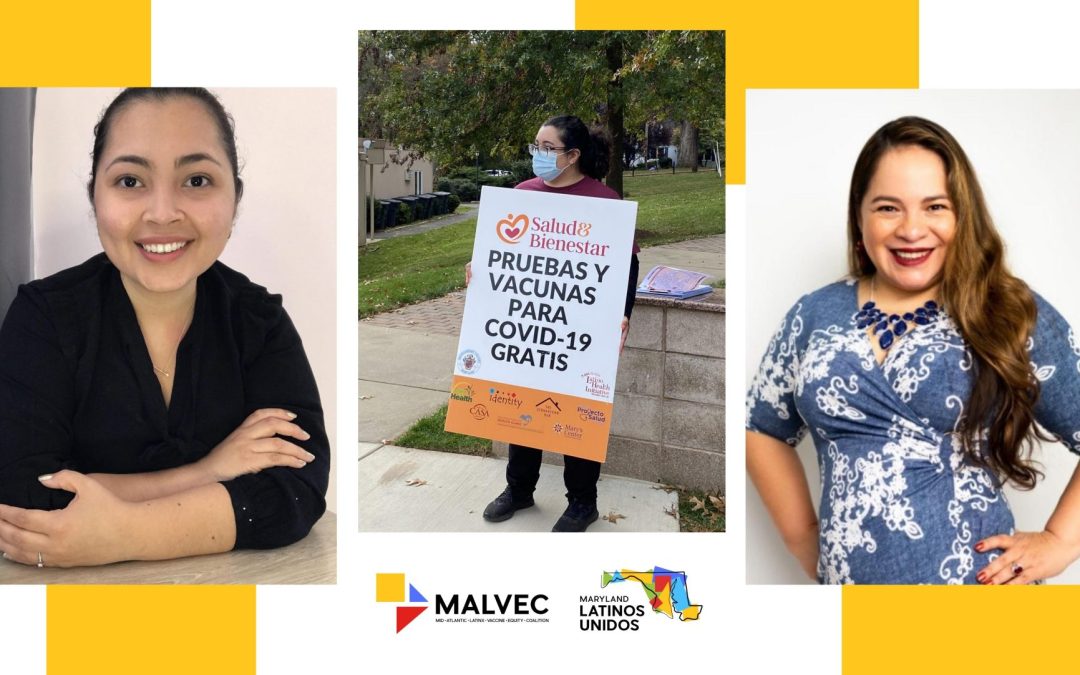As we move forward to a post-pandemic existence, how do we reach equity in healthcare access for Latinos? What would that look like, what are best practices, and what are the unforced errors? And the ultimate question: what holds Latinos back as a community when it comes to accessing the healthcare that they need?
At Maryland Latinos Unidos, we believe in finding solutions to these challenges. Though important to advocate on a community’s behalf, it’s not enough to simply protest or point out that there are barriers. Therefore, MLU has established three primary actionable initiatives based on results from the program we manage, the Mid-Atlantic Latinx Vaccine Equity Coalition (MALVEC):
We must:
- Address communication barriers and enhance cultural competence in healthcare in Maryland,
- Inform healthcare systems about the deterrents that hold back Latinos, especially Latino immigrants, from accessing healthcare, and,
- Work to establish the development of a permanent system of Community Health Organizing teams that engage vulnerable community members and help them navigate through the complexities of healthcare throughout the state.
Systems change is a process that requires all parties to pull together. We hope these three initiatives will identify areas where we can collaboratively create systemic change based on what has worked in the past. We must avoid repeating what tends to keep our community in a perpetual cycle of repetition whereby they are unable to consistently maintain healthy habits and constantly face obstacles to healthcare.
Communication is a significant barrier to accessing healthcare. In county Health Equity Reports across the state, the language barrier appears consistently as a challenge to engage Latino community members.
Healthcare organizations have a growing responsibility to improve diversity, equity, and inclusion (DEI) efforts not only for their employees but also to better serve patients and their families. Beyond bilingualism and cultural sensitivity, there is also a lack of understanding about how regional Spanish-language media works and how Latinos receive information.
The healthcare industry has a particularly unique opportunity to make a greater impact, as it directly affects a broad set of patient health outcomes and quality of life in a profound way. The pandemic laid bare how immigrants in particular face cultural and logistical challenges when suffering from a serious illness. Health care professionals and health care systems need to be prepared to address the unique cultural needs of immigrants, including language differences, health literacy deficiencies, insurance barriers, and limited financial and social resources.
We know that historically, in Maryland and across the country, Latinos generally hesitate to access healthcare due to many deterrents. These include language, lack of understanding, and fear for all kinds of reasons, including mis- and disinformation.
The deterrents can be complex and often include deep-seated and even inter-generational traumas. Addressing these requires an understanding of the stigmas in the Latino community that surround issues like mental health and disabilities. It requires understanding Machismo and the strong roles that gender plays in Latino families and society, as well as the roles of religion, charity, and classism. It is also important to know what care is available for these individuals if their immigration status is in question or they are afraid to lose their opportunity to receive a green card because they believe they ‘crossed a line’ by accepting assistance.
We believe an effective way to address deterrents is with strong, bilingual Community Healthcare Organizing Teams composed of Community Health Workers and Community Health Organizers.
Community Health Organizing teams, composed of bilingual and culturally sensitive members of the community itself, enable Latinos to gain access to healthcare by overcoming the deterrents that make them hesitate.
At MALVEC, our teams are composed of Community Health Workers (CHWs) and Community Health Organizers (CHOs) who coordinate resources and act as liaisons with local healthcare systems. The CHOs stay up to date on the latest healthcare trends and offerings in the counties they work in, ensuring that the CHWs know what is available. The CHWs themselves represent the last mile between community services and communities served.
When there is no crisis, like the COVID-19 pandemic, these Community Health Organizing teams are among the first positions to be eliminated. The cycle of temporary support when there is a crisis, then slowly rolling back to old habits once the crisis is largely averted and funders have moved on to other issues, means that barriers to receiving care remain intact.
At the end of it all, to create true systems change requires policymakers to commit to the process and be willing to put resources behind the necessary adjustments. It requires prioritizing the changes and not just the bottom line.
Maybe the time has come for a different healthcare system altogether – a single-payer system, perhaps? Until such changes take place, we must be conscientious and supportive of one another. All of our communities can’t afford to wait for another crisis. It’s time to address the challenges we are facing today to build a system of care for all – one where healthcare as a human right prevails.

